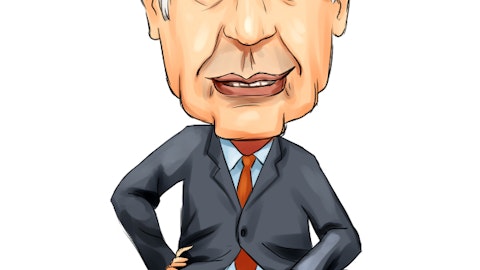Although the average hedge fund has been struggling to beat broader market benchmarks in recent years, the hedge fund industry as a whole has been constantly growing. The hedge fund industry is also giving birth to more and more billionaires, while the stock market appears to be rewarding hedge fund managers for their exceptional skills and knowledge. It is true that hedge funds have not met expectations over the past several years when it comes to performance, so will 2016 mark a turnaround for the smart money industry? Let’s wait and see. Moving on to the underlying purpose of this article, we will be discussing three filings submitted by Kevin Kotler and billionaires Carl Icahn and Mark Lasry.
Imitating hedge funds and other institutional investors can help identify some of the most profitable stocks on the market. However, our extensive research that covered the period between 1999 and 2012, showed that the best approach is to follow these investors into their small-cap stocks. Our backtests showed that the 15 most popular small-cap stocks among hedge funds managed to generate a monthly alpha of 81 basis points, versus an alpha of 0.7 percentage points posted by their top 50 large-cap picks (see more details here).
As revealed by a newly-amended 13D filing, Icahn Capital LP currently owns 92.38 million shares of Xerox Corp (NYSE:XRX), which make up 9.12% of the company’s outstanding common stock. This compares with the stake of 82.31 million shares revealed by Icahn through his fund’s previous 13D filing on Xerox, which was submitted with the SEC in mid-December 2015. Earlier this morning, Xerox announced its decision to split into two publicly-traded companies, a Document Technology company and a Business Process Outsourcing (BPO) company. Furthermore, Xerox and Carl Icahn announced that they reached an agreement that relates to the governance of the BPO company, which stipulates that Xerox will appoint six directors to the soon-to-be created company’s Board, while the activist investor will select three directors. The Document Technology company is set to retain its industry leading role in document management and document outsourcing, while the BPO company will continue to provide services that manage customers’ business activity and process. Although Icahn was not the one who came up with “the split” idea (or at least he didn’t publicly advocate this move), he applauded the company’s decision by saying “I applaud and respect Ursula Burns [Xerox’s CEO] for doing what she believes shareholders want”. The reasoning behind the decision to split Xerox Corp (NYSE:XRX) into two separate companies is that the aforementioned businesses serve different client needs, have different growth drivers, and need personalized operating models and capital structures. Xerox anticipates that the split will be completed by the end of 2016. Meanwhile, Xerox shares have jumped by more than 5% so far in today’s trading session, but are still down by 27% over the past year. Brian Jackelow’s SAB Capital Management acquired a 4.49 million-share stake in Xerox Corp (NYSE:XRX) during the third quarter.
Follow Carl C. Icahn's Icahn Capital LP
The second page of this article discusses two other filings submitted with the SEC.
According to a separate 13D filing, Marc Lasry’s Avenue Capital currently owns 4.80 million shares of YRC Worldwide Inc. (NASDAQ:YRCW), which account for 14.7% of the company’s outstanding common stock. This denotes a decrease of 1.08 million shares from the stake revealed through the fund’s quarterly 13F for the July-to-September period. The shares of the transportation services company have dropped by 37% over the past 12 months. However, the recent plunge has resulted in more attractive price-to-earnings multiples for the company. For instance, the stock trades at a forward P/E ratio of 5.90, which is substantially below the ratio of 15.38 for the S&P 500 companies. YRC Worldwide Inc. (NASDAQ:YRCW)’s consolidated operating revenue for the first three quarters of 2015 totaled $3.69 billion, which marked a decrease of 4.2% year-over-year. The decline in the company’s top-line results was mainly attributable to lower fuel surcharge revenue and to a drop in volumes. Nonetheless, the company managed to generate $24.2 million in net income during the first three quarters of 2015, which compares with a net loss of $73.9 million reported for the same period of the prior year. The smart money sentiment towards the stock was very positive in the third quarter, as the number of hedge funds with positions in the company climbed to 27 from 18 quarter-over-quarter. Funds tracked by Insider Monkey held slightly more than 49% of the company’s outstanding shares. Richard Mashaal’s RIMA Senvest Management cut its stake in YRC Worldwide Inc. (NASDAQ:YRCW) by 41% during the third quarter to 1.29 million shares.
Follow Marc Lasry's Avenue Capital
Let’s wrap up our discussion by examining the 13G filing submitted by Kevin Kotler’s hedge fund. Broadfin Capital reported owning 7.52 million shares of Raptor Pharmaceutical Corp. (NASDAQ:RPTP), which represent 8.83% of the company’s outstanding shares. The round of 13Fs for the third quarter disclosed that the healthcare-focused hedge fund owned 1.41 million shares of Raptor Pharmaceutical on September 30. The biopharmaceutical company focuses on developing treatments for rare and debilitating diseases, while its first FDA-approved product, PROCYSBI, is aimed at managing nephropathic cystinosis in adults and children (6+ years old). Nephropathic cystinosis is an inherited condition that causes the buildup of a protein building block named cystine, which in turn causes kidney and other problems. PROCYSBI was approved back in 2013, but the company later received FDA approval for the expanded use of this drug to treat children from two to six years-of-age suffering with nephropathic cystinosis.
The shares of Raptor Pharmaceutical Corp. (NASDAQ:RPTP) are down by 55% over the past year, mainly owing to a failed Phase 2b clinical study on RP103 in children with biopsy-confirmed nonalcoholic steatohepatitis (NASH). A total of 21 hedge funds from our system had stakes in the company at the end of September, accumulating nearly 15% of its shares. Jason Karp’s Tourbillon Capital Partners added a 1.50 million-share position in Raptor Pharmaceutical Corp. (NASDAQ:RPTP) to its portfolio during the third quarter.
Follow Kevin Kotler's Broadfin Capital
Disclosure: None




